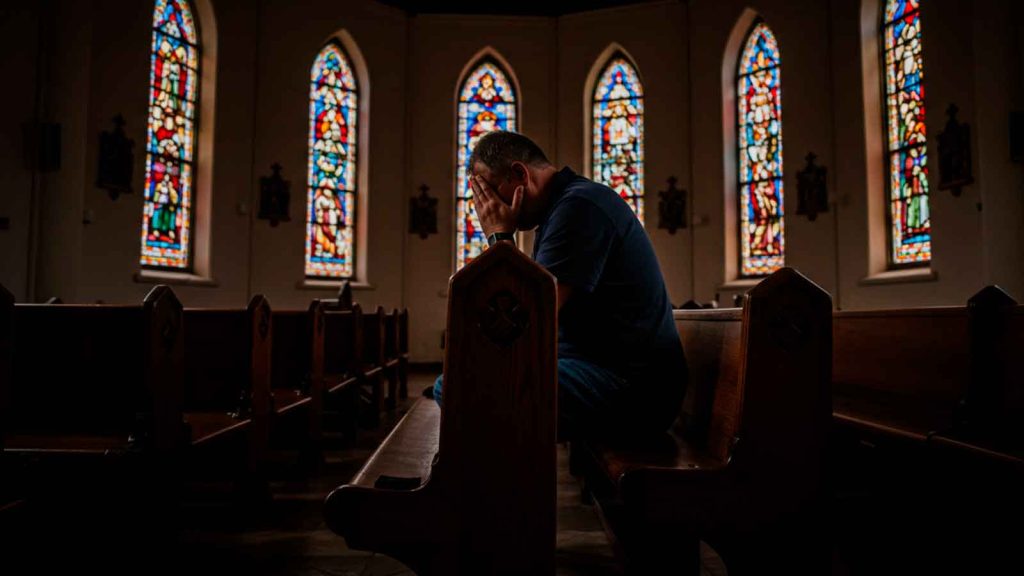Psalm 88 is one of the most intense and somber poetic texts of the Bible. Right from the start, we are led to feel the psalmist’s anguish and loneliness as he desperately cries out for help. This psalm is known for its brutal honesty and for lacking a joyful ending, unlike many other psalms that close with praise or hope. In this article, we will explore Psalm 88 in depth, analyzing its meanings, historical context, interpretations, and teachings.
Psalm 88 Complete
¹ LORD God of my salvation, I cry out before You day and night.
² May my prayer come before You; incline Your ear to my cry;
³ For my soul is full of troubles, and my life draws near to the grave.
⁴ I am counted among those who go down to the pit; I am like a man without strength,
⁵ Adrift among the dead, like the slain who lie in the grave, whom You remember no more, for they are cut off from Your hand.
⁶ You have laid me in the lowest pit, in darkness, in the depths.
⁷ Your wrath lies heavy upon me; You have afflicted me with all Your waves. (Selah.)
⁸ You have taken my acquaintances far from me; You have made me an object of utter loathing to them. I am shut in and cannot escape.
⁹ My eyes grow dim because of affliction. LORD, I have called on You every day; I have stretched out my hands to You.
¹⁰ Will You work wonders for the dead? Shall the dead rise up and praise You? (Selah.)
¹¹ Shall Your loving-kindness be declared in the grave, Your faithfulness in Abaddon?
¹² Shall Your wonders be known in the darkness, or Your righteousness in the land of forgetfulness?
¹³ But I, LORD, cry out to You; in the morning my prayer comes before You.
¹⁴ LORD, why do You reject my soul? Why do You hide Your face from me?
¹⁵ I have been afflicted and ready to die from my youth; while I suffer Your terrors, I am distraught.
¹⁶ Your fierce wrath has swept over me; Your terrors have cut me off.
¹⁷ They surround me all day long like water; they completely encircle me.
¹⁸ You have taken loved one and friend far from me; my acquaintances are in darkness.

Psalm 88 Complete and Explained
Psalm 88:1
“LORD God of my salvation, I cry out before You day and night.”
The psalmist begins by recognizing God as his only source of salvation and shows that he never stops praying, crying out day and night in an unceasing search for an answer.
Psalm 88:2
“May my prayer come before You; incline Your ear to my cry;”
Here he asks that his prayer reach God’s very presence and that He bend His ear as a sign of urgent attention to the plea.
Psalm 88:3
“For my soul is full of troubles, and my life draws near to the grave.”
The psalmist feels his soul weighed down with pain and believes he is on the brink of death, overwhelmed by anguish and despair.
Psalm 88:4
“I am counted among those who go down to the pit; I am like a man without strength,”
He considers himself among the dead, like someone weakened, with no vigor to resist the pain consuming him.
Psalm 88:5
“Adrift among the dead, like the slain who lie in the grave, whom You remember no more, for they are cut off from Your hand.”
The psalmist feels forgotten by God, like those who have died and are no longer under divine care.
Psalm 88:6
“You have laid me in the lowest pit, in darkness, in the depths.”
He believes God has placed him at the deepest, darkest point of his existence—an abyss with no light.
Psalm 88:7
“Your wrath lies heavy upon me; You have afflicted me with all Your waves. (Selah.)”
He feels that God’s anger weighs on him like waves that continuously drown him, increasing his suffering.
Psalm 88:8
“You have taken my acquaintances far from me; You have made me an object of utter loathing to them. I am shut in and cannot escape.”
The psalmist laments social abandonment: his acquaintances have departed, he has become rejected, and now he is trapped in a hopeless state.
Psalm 88:9
“My eyes grow dim because of affliction. LORD, I have called on You every day; I have stretched out my hands to You.”
Even weakened and frail, he does not stop praying and daily stretches his hands toward God, showing constant supplication.
Psalm 88:10
“Will You work wonders for the dead? Shall the dead rise up and praise You? (Selah.)”
The psalmist questions the purpose of death, asking whether the dead can witness God’s miracles or rise to praise Him.
Psalm 88:11
“Shall Your loving-kindness be declared in the grave, Your faithfulness in Abaddon?”
He asks whether God’s goodness and faithfulness can be proclaimed from beyond, reinforcing his desire to live and testify to such virtues.
Psalm 88:12
“Shall Your wonders be known in the darkness, or Your righteousness in the land of forgetfulness?”
The psalmist continues arguing that, in death, there is no remembrance or proclamation of God’s works and justice.
Psalm 88:13
“But I, LORD, cry out to You; in the morning my prayer comes before You.”
Despite all the pain, he keeps praying and hopes that God will hear his pleas at dawn.
Psalm 88:14
“LORD, why do You reject my soul? Why do You hide Your face from me?”
He expresses a deep feeling of rejection and spiritual abandonment, asking why God seems distant.
Psalm 88:15
“I have been afflicted and ready to die from my youth; while I suffer Your terrors, I am distraught.”
The psalmist reveals that his suffering did not start now: since youth he has lived in distress, and now he is utterly disturbed by divine terrors.
Psalm 88:16
“Your fierce wrath has swept over me; Your terrors have cut me off.”
He describes suffering as something that slices and tears him apart, as though God’s terrors pass over him violently.
Psalm 88:17
“They surround me all day long like water; they completely encircle me.”
He feels utterly surrounded, besieged by suffering and terrors, like relentless waters.
Psalm 88:18
“You have taken loved one and friend far from me; my acquaintances are in darkness.”
The psalmist closes by reaffirming abandonment: loved ones and companions have vanished, and acquaintances are now distant, shrouded in darkness, leaving him alone.
What Is Psalm 88?
Psalm 88 is a psalm of lament, written to express deep, seemingly unsolvable suffering. It belongs to the collection of the “Sons of Korah,” a group of musicians and poets associated with the temple in Jerusalem. Authorship is attributed to Heman the Ezrahite. This psalm is peculiar because it maintains a dark tone from beginning to end, with no relief from pain through a hopeful conclusion.

Structure and Themes of Psalm 88
The Psalmist’s Cry
From the first verses, Psalm 88 shows a man in despair, crying to God day and night. He feels his soul filled with troubles and believes he is near death. This profound lament reveals not only physical or emotional pain, but a sense of spiritual abandonment.
The Experience of Isolation
Another central theme of Psalm 88 is isolation. The psalmist states that friends and acquaintances have withdrawn, and he is surrounded only by darkness. This feeling of loneliness intensifies the suffering experienced.
The Absence of an Answer
Unlike other psalms, where the psalmist ends with praise or renewed confidence in God, Psalm 88 offers no answer or solution. It ends as somberly as it begins, leaving the reader immersed in the author’s pain.
Historical Context of Psalm 88
Who Was Heman the Ezrahite?
Heman was one of the chief musicians of the temple, known for his wisdom and talent. He belonged to a lineage of Levitical musicians responsible for songs and praises in the temple. The fact that Heman composed such a suffering-laden text shows that even those very close to religious practice were subject to profound personal crises.
The Role of Lament Psalms
In Jewish tradition, lament psalms like Psalm 88 played an important role: they were sincere prayers from those who acknowledged pain and suffering before God. These texts allowed difficult emotions to be expressed without fear, showing that true faith includes even moments of doubt and pain.
Spiritual Lessons from Psalm 88
Honesty in Prayer
Psalm 88 teaches us that there is no need to mask pain before God. He welcomes our cries even when we have no words of gratitude or hope.
The Value of Lament
This psalm legitimizes lament as part of spiritual life. It shows that suffering does not invalidate faith; on the contrary, it is part of the relationship with God.
Persistence in Seeking God
Even without answers, the psalmist continues to cry out. This reveals a persistent faith that does not depend on immediate results.

Curiosities About Psalm 88
- It is considered the darkest psalm in the entire Psalter.
- It does not end with words of hope, making it an exception among lament psalms.
- It is used in liturgical traditions for moments of deep reflection and penitence.
Applying Psalm 88 in Daily Life
For Those Who Are Suffering
Psalm 88 is a powerful companion for anyone who feels alone or hopeless. It shows that even moments of darkness have a place in spiritual experience.
For Those Who Want to Understand Others’ Pain
This psalm also helps develop empathy, as it connects us with the pain of others and teaches us to respect the time and space of lament.
For Those Seeking a More Sincere Faith
Psalm 88 challenges us to abandon superficial faith and embrace a more honest spirituality that includes pain, silence, and absence.
FAQ About Psalm 88
Does Psalm 88 Contain Any Hope?
Although it ends somberly, the mere act of crying out to God already reveals a thread of hope. Whoever laments still believes that God is listening.
What Can We Learn from Heman?
We can learn that even wise people close to God face moments of profound suffering—and that does not make them less faithful.
Should Psalm 88 Be Read in Difficult Times?
Yes, it is especially relevant in times of crisis when words of comfort are not enough and what is needed is companionship in suffering.
Why Does God Allow Suffering?
Psalm 88 does not answer this question directly, but it shows us that God allows suffering to be expressed, welcomed, and transformed into prayer.
READ ALSO:
- 50 Beautiful Verses to Strengthen Faith and the Heart
- Proverbs 15 – Reflections That Transform
- Birthday Message: Biblical Inspiration to Celebrate
FOLLOW US ON FACEBOOK
I hope you enjoyed it